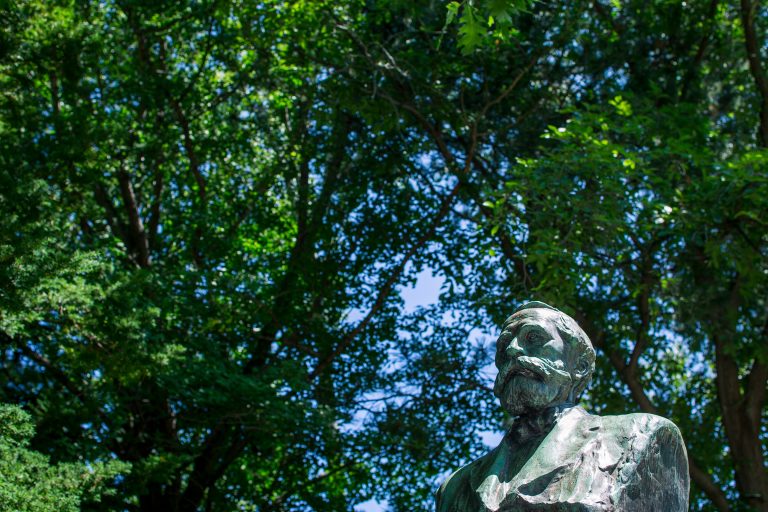Hokkaido University is a leading comprehensive university that places importance on its graduate schools. The university started out in 1876 as the Sapporo Agricultural College, the first modern academic institute in Japan. During its long history, the college was promoted to an Imperial University and then flourished after the creation of the new university system. Over this period, we have declared and cultivated our basic philosophies of education and research, namely the “Frontier Spirit,” “Global Perspectives,” “All-round Education” and “Practical Learning.” In order to meet the demands of society and to move ahead as a part of the National University Corporation, Hokkaido University needs to formulate a long term goal for developing the basis of knowledge generation, dissemination and application in the new century, while still reconfirming our basic philosophies and recognizing our accountability to society.
Frontier Spirit
Our Frontier Spirit epitomizes the ideal that students, academics and administrative staff should resolutely take up their daily challenges with an eye to forging new paths. It has its origins in the words “lofty ambition” uttered by Dr. W. S. Clark during the opening ceremony of Sapporo Agricultural College. This basic philosophy has served as the foundation on which Hokkaido University has rested for more than a century. The twenty-first century frontier spirit manifests itself in our continued expansion of research in response to shifting academic paradigms and the new challenges facing humanity. Based on a firm foundation of academic freedom, Hokkaido University aims to encourage creative research that does not separate theory from practice, and to promote world-class studies to solve the problems confronting humankind. We will do so by dramatically improving our research and educational activities via the flexible organization of our graduate schools and other networks.
Global Perspectives
From its very start, Sapporo Agricultural College was always open to different world-views, introducing Western culture, science, and technology, and providing English-language lectures by foreign teachers. Ever since, many of our graduates have played active roles overseas, and our philosophy of the value of acquiring global perspectives has been passed down in many different forms. Needless to say, we must cultivate a better understanding of other cultures by enriching our liberal arts education, underpinned by an awareness of our own culture. By cultivating communication skills in foreign languages, we can better prepare ourselves for playing a more active role in the global arena. To help our students and staff acquire global perspectives and thus contribute to the development of an international society, Hokkaido University seeks to provide ample opportunities for study and research abroad. We actively encourage the admission of foreign students and researchers, and promote cultural and social exchanges with people in Asia, the northern regions, and throughout the rest of the world.
All-Round Education
Sapporo Agricultural College not only trained agricultural experts, but also produced graduates endowed with a rich humanity, lofty intellect, and broad range of knowledge. The results can be seen in the succession of outstanding thinkers and literary figures the college produced, including Kanzo Uchimura, Shigetaka Shiga, Inazo Nitobe, and Takeo Arishima. This philosophy of an all-around education has been handed down at Hokkaido University through our tradition of emphasizing a liberal arts education as the key to producing graduates armed with the well-rounded acuity and deep insights they need to apply their specialized knowledge. To further advance this philosophy, Hokkaido University seeks to provide an all-around education that will cultivate a rich humanity and lofty intellect, foster a spirit of freedom and independence, and encourage students to establish autonomous identities. We believe this kind of education produces graduates who respect human rights and have the basic abilities required to accurately respond to society’s needs.
Practical Learning
Our philosophy of emphasizing practical learning acquired a dual significance in the course of the various hardships Sapporo Agricultural College overcame as it developed into today’s comprehensive university. We view research as the process of creating universal learning that is integrated with the real world, and we seek to emphasize not only basic research but also focus on returning the fruits of our research to society by prioritizing its practical applications. The botanical research conducted by Kingo Miyabe and the research on snow by Ukichiro Nakaya, both carried out in the vast wilderness of Hokkaido, are outstanding examples of research on familiar topics that led to universal truths. Much of the research at Hokkaido University is developed in collaboration with regional industries. Hokkaido University intends to pursue a modern emphasis on practical learning, utilizing absolute truths that are grounded in the real world. By making full use of Hokkaido’s unique characteristics and expanding our collaborations within government, industry, and academia, we aim to give back the fruits of our research to Hokkaido, Japan, and the rest of the world. In addition, Hokkaido University strives to produce leading experts and professionals in our graduate schools, and to improve our adult education program.

